Gaius Julius Caesar: Inheritance
Gaius Julius Caesar (13 July 100 - 15 March 44 BCE), Roman statesman, general, author, famous for the conquest of Gaul (modern France and Belgium) and his subsequent coup d'état. He changed the Roman republic into a monarchy and laid the foundations of a truly Mediterranean empire.
Caesar's inheritance (44-27)
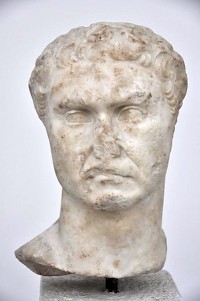
The conspirators wanted to restore the republic, but instead, another round of horrors followed. There were troops; there were politicians who aspired to Caesar's autocratic power; and they were prepared to use the troops.
Mark Antony, the consul, was now the official head of the state, and his first act was to secure the co-operation of the commander of Caesar's troops outside Rome, Lepidus. Shortly after sunset, he confiscated Caesar's papers and treasury. Having the men and the money, he could negotiate from a position of strength, and on March 16, he announced a meeting of the Senate, which was to take place on the next day. During this meeting, he dictated the murderers a compromise: they were to receive amnesty while Caesar's acts were to be respected, and he would be worshipped as a god. From now on, Mark Antony was in charge of the city.
That very day, Piso opened the testament of his son-in-law. It contained precisely the material that Mark Antony needed: Caesar left his gardens as a park to the city of Rome, and gave every inhabitant a large amount of money. On 20 March, the corpse was burned on the forum (text). The Roman mob saw the blood-stained cloak, and heard of the money that was to be distributed among them. Then, Mark Antony delivered a short funeral oration (quoted here), in which he inflamed their emotions: that night, Caesar's murderers had to escape from the city that they had wished to liberate.
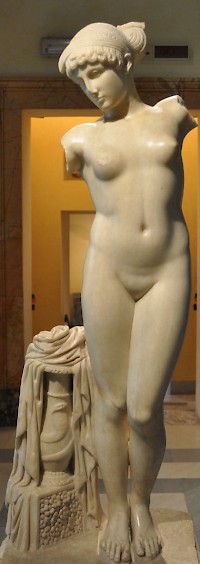
In the Summer, a comet appeared, and many people believed that this was Caesar, who had by now become a god. Lepidus, by now Caesar's successor as Rome's high-priest, agreed to this interpretation. From now on, Mark Antony was backed up by the gods themselves.
There was one minor cloud on Mark Antony's horizon: Caesar had left three quarters of his estate to his great-nephew Octavius, who was with the army in the east. More important, Caesar had adopted him as a son, which meant that the eighteen years old Octavius had to change his name and would from now on be called Gaius Julius Caesar Octavianus, i.e. the Julius Caesar from the Octavius family. Modern historians usually call him Octavian, but it should be stressed that he never used that name; he was clever enough to call himself Caesar.
The young man decided to return to Italy, and demanded his share, which Antony had already confiscated. At first, nobody seemed to notice the boy, except for Caesar's veterans. Even though the Octavian Caesar couldn't pay them, the soldiers were enthusiastic and loved him. Soon, the veterans of the legions VIIand VIII, who had been settled near Capua, joined him. Two legions of Mark Antony, called Martia and IIII Macedonica, sided with him as well.
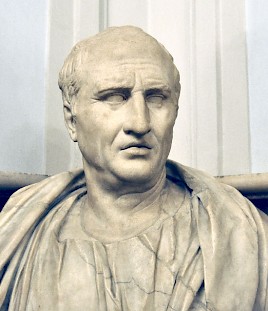
By accident, Decimus Brutus was governor of Cisalpine Gaul, and Mark Antony had reason to fear his troops. Therefore, he left Rome to drive them away. While the two were fighting at Modena (on the south bank of the river Po), the Senate convened, and Cicero held several speeches in which he tried to incriminate Mark Antony, pointing out that the consul would return with an army and terminate the Senate's power. This, he argued, was the moment to restore the republic, and Caesar Octavianus might be useful ("we must praise the boy, give him a command and then put him away"). The Senate agreed and gave him a military command.
The young man didn't disappoint the Senate: in two battles in the spring of 43, he and the consuls Hirtius and Pansa defeated Mark Antony, who fled with difficulty across the Alps, where he managed to gain the support of all troops in Hispania and Gaul. Then, Caesar Octavianus showed that actually, he had used Cicero: he marched on Rome and demanded the consulship. Not for the first time, the Senate had to yield to a revolutionary leader with an army. But never had the commander been so young.
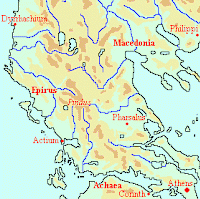
In control of the city, Caesar Octavianus declared Mark Antony's compromise to be illegal and outlawed the murderers of his father. Then, unexpectedly, he decided to sign peace with Antony: Octavianus had learned that it was impossible to defeat the man who controlled Hispania and Gaul, but together they could destroy the republic, if they managed to defeat Caesar's murderers, who possessed some troops in the east. In October 42, Brutus and Cassius were defeated at Philippi, on the northern shore of the Aegean Sea.
By now, Mark Antony, Caesar Octavianus and Lepidus had formed the Second Triumvirate and divided the Mediterranean: Mark Antony received the east, Lepidus Africa and the rest was to be Caesar Octavianus'. Unlike the first triumvirate, which was a private contract, this was an official magistracy, and the People's Assembly and the Senate ratified the Titian law, which gave these three men dictatorial powers. Cicero was against this bill, but a murderer took care of him. Formally, the republic had ended.
Caesar Octavianus was a brave man; he had appreciated political realities; and he was a skilled diplomat. But his successes would not have been this dazzling if his name had not been Gaius Julius Caesar, and if he had not been able to claim to be the son of a god.
More successes were to come. Mark Antony fell in love with Cleopatra (see coins) and launched a disastrous expedition against the Parthians. It was easy for Caesar Octavianus to present Mark Antony's acts as sacrificing Roman interests to an oriental mistress. On August 2, 31, Julius Caesar's heir defeated Mark Antony in a naval engagement off the Greek coast, the Battle of Actium. Lepidus was appointed pontifex maximus, and will probably have been glad that he had managed to survive the civil war.
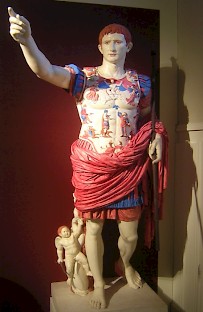
Now, it was Caesar Octavianus' turn to make monarchy acceptable, and he found the way that Julius Caesar had merely guessed: in January 27, he laid down his triumviral powers, saying that he was content with the honor of restoring the republic. He would be content with the name Augustus ("the exalted one"; cf. the statue that shows him as a heroic visionary). However, he had already convinced the Senate that the real choice was between a free but chaotic republic and the stable government of one man. The Senate implored him to accept the powers of magistratures (like consulship) without occupying the magistratures themselves. In this way, Augustus managed to control the government behind a republican façade, backed by strong armies.
Caesar Augustus turned out to be the true heir of his divine father: many of Julius Caesar's plans were now implemented. The most important of these was the granting of citizenship to people who did not live in Italy. In the first century BCE the Roman republic changed into a Mediterranean empire, and Julius Caesar speeded up this process; Caesar Augustus was the executor of this will.